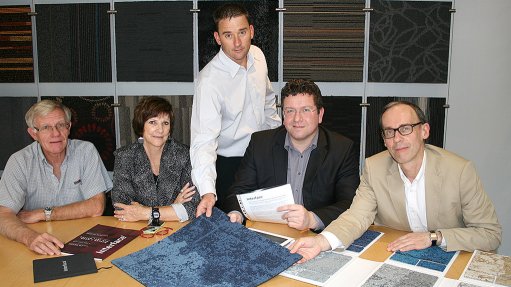
NET EFFECT A carpet tile produced from discarded fishing nets, collected in the Philippines is shown by carpet tile producer Interface
As part of global carpet tile producer Interface’s carpet recycling programme, its local distributor, Kevin Bates Flooring & Carpeting Group (KBAC), has collected 4 000 m2 of used tile carpets and distributed them to several local charities.
“The aim of Interface’s recycling programme is to remove used nonbiodegradable carpets from landfill sites, thereby preventing environmental damage, as carpets contain a high oil content in the nylon fibres and backings used to produce the carpets,” KBAC CFO Neil Duncan explains.
Interface states that its re-entry progamme will enable it to reclaim existing carpet tiles or broadloom and either recycle, downcycle or repurpose them. “We guarantee that your old carpet will not end up on a landfill site,” reports Interface.
The company, whose Netherlands-based factory is operating on 100% renewable energy and is using 100% recycled water in its manufacturing processes, has reached a zero waste-to-landfill level. In Europe and the US, Interface recycles any old carpeting it removes in some form or other.
KBAC sales director Brandon Park tells Engineering News that carpets in commercial properties and upmarket residential complexes typically have a life span of between 5 years and 15 years, depending on the quality of the carpet. These carpets are usually replaced or removed when property owners refurbish their property.
Carpet tile and broadloom carpets can be recycled through the programme, provided that the carpets are in a suitable condition for recycling.
The company decided to start a local leg of the programme, known as Re-Use, to mitigate costs associated with shipping used carpets for recycling to Interface’s mills abroad.
“To keep the old carpets from reaching landfills, we identify worthy recipients, such as schools, community centres, nongovernmental organisations, as well as any other places where young, old and infirm members of deprived communities can benefit, and donate the carpeting,” Duncan says.
KBAC offers the recycling of carpets as a free service when it is contracted to carry out new carpet installations. “We do not currently offer this service to companies and individuals who employ other contractors to carry out the work, as there is a cost involved for KBAC in terms of the recycling programme” he says.
“Currently, laying the carpets at charities is carried out by the recipients; however, we are investigating the possibility of providing a short-term skills programme to teach individuals to install the carpets on behalf of participating charities,” says Park, adding that this is a potential employment and upskilling initiative.
KBAC group member Albert Carpets, in Cape Town, has also adopted this local recycling programme as it has strong social responsibility elements. KBAC is a member of building and construction industry representative body the Master Builders Association (MBA) North.
MBA North executive director Mohau Mphomela says the association is proud of this local pioneering recycling initiative by “a member that has set new benchmarks in training for the South African floor covering industry”.
Leading by Example
Meanwhile, Interface has started a programme in the Philippines, where it rewards fishing villagers for collecting old fishing nets, which are converted into raw materials for new carpet production.
It has also started a programme in India, where farmers are growing castor beans to reduce the company’s dependence on oil for carpet production. Interface will use the castor oil in the manufacture of new carpets.